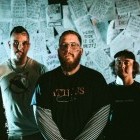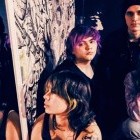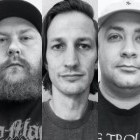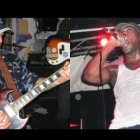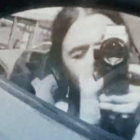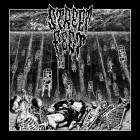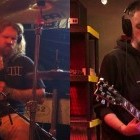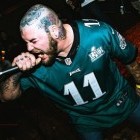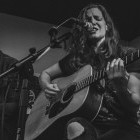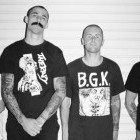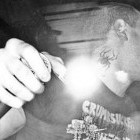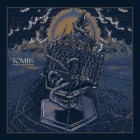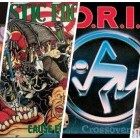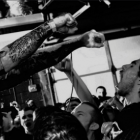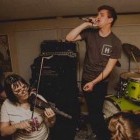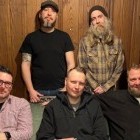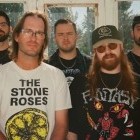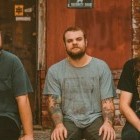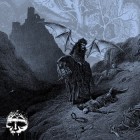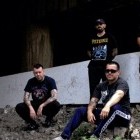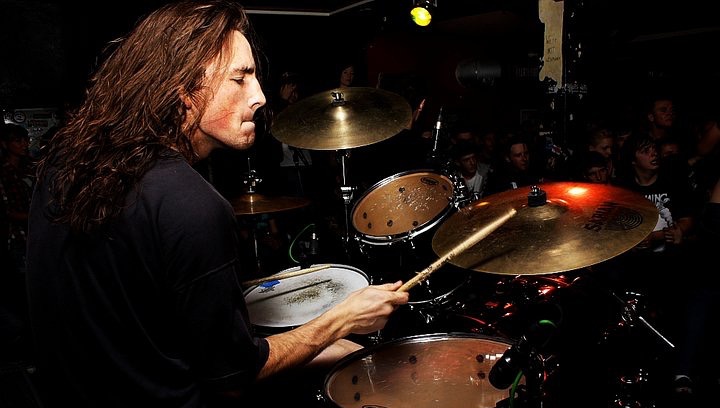
Becoming a drummer is a pain for a ton of reasons; there’s no way to do it quietly, storing them is a hassle, and transporting them is even worse. I sat down with drummer and nicest guy in the world, Aaron O’Neil, to discuss how he got started with his instrument, how he got into hardcore, and why people talk down about Ringo. From playing in Lights Out and Shook Ones to jobbing for Ceremony and Punch, Aaron has spent most of the last 15 years involved in hardcore.
Thanks for sitting down with me.
Yeah, thanks for doing it in person.
Of course. So, I understand your dad was a drummer, is that right?
My dad was a drummer as a kid, and he played the drums as a teenager. When he went to college, I think, for numerous reasons; not having the drums around or the space, he stopped playing. But, it was also, you know, 1969— and he and everyone he knew fell in love with folk music and Bob Dylan, so he started playing guitar. My dad’s played guitar since he was 18 or 19 and that’s really what he’s done musically. But yeah, he was a drummer early on. He tells me that my grandpa, his dad, was also a drummer as a kid. Now, I don’t think they played much, and I don’t know much about his playing, but my dad played in a band with his two cousins who lived next door. My dad’s mom was a twin and when the twins got married, they bought houses next door to each other, which is really cool. So, he played in a band with his cousins.
So, I know you and your sister both play music, was music just in the family and implemented early on?
Yeah, it was never pushed.
Sure, but it was around the house, right?
It was pervasive. Not only with my dad playing music, playing guitar and singing us songs in a very “dad” way, but my parents met each other when they worked in a record store. So, obviously, that background and they loved music enough to work in a record store, and they have a big record collection with all these stories of bands they’ve seen, there was always music playing. There was music around and instruments, and I kind of just gravitated towards the drums.
When was that? When did drumming become a thing you wanted to do?
I actively asked my parents if I could do it when I was seven, but I had started banging around on things before that. My dad had some drumsticks and the toy collection— like, the kids play area, like little bongos. I would play along to those when he was playing music, or when my sister was singing and dancing or whatever. I think I’ve seen pictures of me really young, like three or four, playing or hitting something.
Like, tapping along.
Yeah, but it was really at the age of seven that I realized I wanted to do it, and I asked my parents if I could and they said yes. That was very cool of them.
So you got into drums before you got into punk music or more aggressive music?
Yeah, absolutely. I was a drummer first and always, it kind of feels like. I was into music then, mostly stuff that my parents liked, you know? A lot of Beatles in our house, Rolling Stones, a lot of classic rock and early rock 'n’ roll, stuff like that. So, that was the first stuff I learned, playing along with The Beatles and Ringo. It was really great, there’s so much fundamental stuff there, and that was the music I played with my dad when I was a little kid. Yeah, it was well before I was into punk or anything. I remembered the first time I heard punk music because it was totally different than anything I had heard at home. I remember that first “this is somewhat familiar to me," you know, because it’s all rock 'n’ roll, and it’s all based in similar chords and whatnot— but there was that certain energy and feeling to it. (I remember thinking) “this is definitely different and this is for me," and I’d heard it on the radio.
It was The Offspring (that I heard) at camp one summer, and it was awesome. That was the start of me liking any punk music, that was The Offspring and Green Day, and I was a teenager in the East Bay of California at the time which didn’t hurt, with Green Day and Rancid and all these great bands. The next phase I got into after that was, naturally, listening to radio stations and on MTV and getting into grunge, and I remember hearing Soundgarden on the radio with Nirvana and Alice In Chains, all of those bands. I was still taking drum lessons at that time and my teacher was really cool about me bringing in Pearl Jam and Soundgarden and him teaching it to me. He saw the value in that, along with Smashing Pumpkins. Later on, I got into hardcore through punk and ska, and because of Phil Jones, really, but I had played music before that. I had been in bands with kids at my school and we would cover Red Hot Chili Peppers and blink-182, shit like that.
When you started getting into hardcore, I know you played guitar in Super Unison recently.
Yeah, I did. That was the first time I had played guitar at a show, or in front of anyone.
Ahh, got it. Guitar was after.
Yeah, that was a later thing.
Would Lights Out be where it starts for you?
There was a band before that. That band was called For the Crown which was an East Bay band that we started when we were in high school in Walnut Creek. We did the band for a few years, and, for being anywhere from 15 to 18, we did a lot. We played shows in the East Bay and then we got to play GIlman, which, for us being high schoolers from the suburbs in the East Bay, that was the biggest deal. I mean, it still is awesome when it happens. That’s where it started, and it’s through that band that I met everyone in the Bay area scene. We were young and Phil Jones, once again, was in that band, and we’d tour. We were in high school and we toured on our Christmas break one year. We toured with Modern Life Is War, and it was their first west coast tour.
I don’t know how, but our singer, Andrew Dimaggio— there’s the one person in every friend group where they know about the cool new stuff, they’re the taste maker, and that was Andrew. He knew about all of the cool Boston and Bridge Nine bands and all that stuff, and he had heard about Modern Life Is War. They had just put out that seven-inch, but they had put it out themselves before it was repressed. He had written them and, somehow, we were going to open for them on their west coast tour. I don’t know if they’d booked it all, and I also don’t know if they knew they were going to meet up with a bunch of high school kids on their winter break. We did that, and then we toured the summer after most of us graduated high school, and then we broke up as people went separate ways. That was really the first band, we did a CD. It’s not that great. I don’t listen to it often, and if I do, I cringe at the drumming, but it’s fine.
Do you ever listen back to other old stuff like Lights Out and feel proud of what you played?
Sometimes, I don’t go back and listen to that stuff too often. Sometimes, if I’m feeling nostalgic or if it comes up, yeah. We played some shows a couple years ago and I was listening to it a lot to practice and to get back into it. Listening to those records, I feel pretty good about it. Especially the full length, I’ve always really liked that one. The seven-inch is good but, for me, it’s just so- it’s not juvenile, but the full length felt really good, like some growth. I feel good about that. I don’t listen to anything else from that band, but sometimes I listen to Overload and think we did a pretty good job. The drums on that are pretty good, I stand by them.
Overload is cool.
Thank you, thank you. [laughs]
The whole “Fucking poser, I don’t owe you shit” stuff didn’t stick with you?
Well, you know. [Laughs] You grow out of that, hopefully. It’s good to not be hung up on those feelings as a 33 year old.
I think you went to Europe with Ceremony and Punch, is that right?
I did, yeah. I’ve been able to fill in and do a lot of cool tours as a drummer. That’s something I talked to Ian [Shelton, Regional Justice Center] about early on, and I tell people all the time that there are not enough drummers. I tell people who have kids, friends of mine, to get their kids to play drums. They will have friends and people will want to have them in their bands forever. It’s an easy thing, you just have to be decent and return a phone call. It’s not that hard. This is a good thing, just say yes, even if it’s not a great band. You’ll get to travel and every time you play in front of people, someone will ask you to play for them, especially as a drummer.
I’ve been really lucky to do a lot of touring with bands I’m not actually in. The best ones were with Ceremony and Punch. Ceremony, you know, we were all young kids from the Bay area; they were from the north bay and we’re from the East Bay.
Everyone converged on Berkeley and Oakland for shows. For the Crown, that band that I mentioned, we would play with Life Long Tragedy, an earlier band that had some of those same North Bay people. It’s just interesting how you meet those people with your early bands and your next bands are all a mix of them and everyone partners up in different ways. I knew Ceremony from Lights Out and touring with them, and we’d become pretty close. I got to do a two-week tour with them after their Rohnert Park LP came out. That was really, really fun. We had really great shows and a really special trip. But, nothing beats touring with Punch, just because, obviously, my sister is in the band— my older sister, Meghan, who is just really sweet and awesome and we get along. Not only getting to spend a month together as adults who don’t live in the same place, but getting to do something you love, play music, travel and meet all these cool people, it was really cool. People thought that it was really crazy. Like “oh, you have a fill-in drummer who’s your brother? Oh my God, that’s amazing." Yeah, we’re friends and we play music. I’ve been able to do that, and for the summer before I moved to Seattle, I got to fill-in for this band from Los Angeles, Internal Affairs. Straight edge band, I’m sure you know.
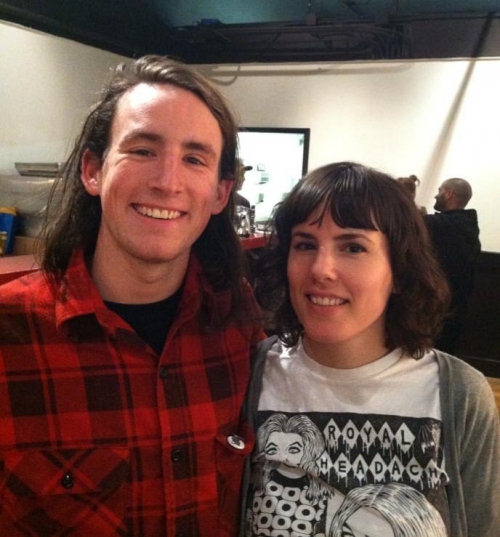
Is that Todd Jones?
Yeah, he was in the band for a bit. It was mostly Corey Williams. Corey and Todd were the guitar players in Carry On. Corey sang (in Internal Affairs) but Todd was in the band for a time. He had played on the full length but he wasn’t on the tour. We had played a couple shows together. The first time I played with them, we were on that Ceremony and Lights Out tour. We were playing at the Showcase Theatre in Corona, CA for the second show of the tour. I had known Dennis and Corey from Internal Affairs and they were supposed to be on the show but their drummer couldn’t do it. They were always having drummer influxes and stuff, so they asked if I thought I could do it and said we could jam in the parking lot before if I learned the songs. So I said “yeah, totally."
Jesus, really?
Yeah, it was one of those. [Laughs] They sent me the songs and I learned them, so when we showed up, we talked about it beforehand. I remember Todd didn’t know. I mean, we kind of knew each other, but he walked up and said “oh, you’re playing drums tonight? Cool. Do you know the songs?” I said yes. He was being an excellent bandmate. Whenever there would be a stop or a change, he would turn around and come back to me to help me cue it. I was pretty prepared and we were doing well, and he was so stoked every time that happened. That was a pretty good memory. But, yeah, I was able to tour with them for a whole month. We did two weeks in Australia and two weeks in Japan, which was really amazing. Once again, just being a fill-in and doing your homework and...
Saying “yes.”
And just saying yes, exactly. I mean, it was all because I said yes to the show a year before, where it was a good show, but it meant I was going to have to learn the songs and play them without practicing, but it turned into really good things. It’s been a pretty awesome part of playing drums, touring, and playing music is filling-in.
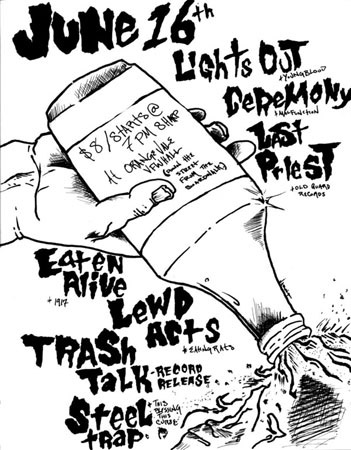
That’s incredible. I’ve been told to ask about your love of triplets.
I love triplets. I mean, what’s not to love? I mean, I really love them mixed in with non-triplet based rhythms. That’s just the most catchy thing to me, and it’s the base for great rhythms like swing and shuffle, it’s all based out of a triplet within a non-triplet thing. I don’t know, it’s a really effective way to catch someone’s ear. They’re great, you should try them. I do love them, all sorts. I don’t know, do you love triplets?
I do.
Yeah, triplets are great.
A couple years ago, maybe even last year, you put out the second Devotion LP.
Yeah, I guess that was a few years ago now. It’s hard to remember, time goes so fast. Yeah, a few years ago.
What went into that? The record took a while, it’s now out. Your drumming was great on it.
Thank you, thank you very much.
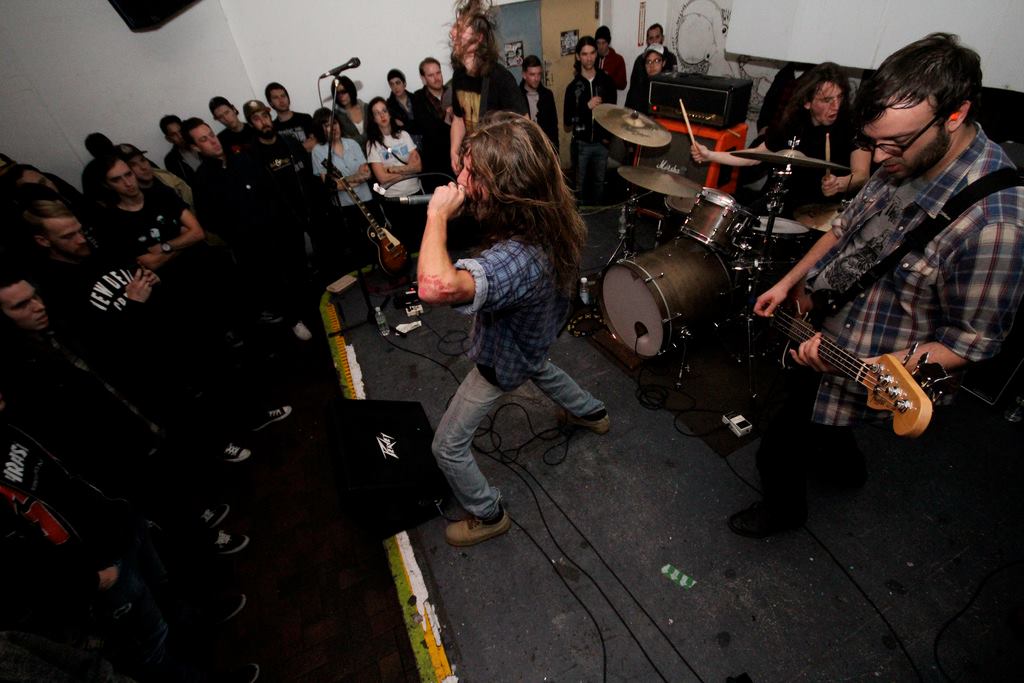
What was the process of that compared to anything else you’ve done?
You know, it was an involved, long process. In what way, the record coming out or the drumming itself, the songwriting or all of it?
Your role in said record.
You know, it’s a Mark Palm band and project, which usually means that the songs are very well-written and well-structured and Mark, who is also a great drummer— did you know that?
Yeah.
Okay, good. He generally has an idea for how he wants the drums to sound. At that point, that was our second Devotion record and it was more of a full band at that point. The first Devotion record was just Mark and I, and it was pretty much him writing everything. He had drum parts in mind, and we flushed them out together. Fills are more organic or up to me to come up with, but it’s mostly from the brilliant, insane mind of Mark Palm— the first record, anyway. That was just the two of us and it was a really awesome experience doing that with him. Eventually, we turned into a real band with members and did some touring and some of those second album Devotion songs were written together. I remember us on an off day in Richmond, VA writing one of the songs and working on it together, and it turned out to be everyone’s favorite song, Mark included.
Most of my role in that was coming up with drum parts or following Mark’s direction. There was maybe some song, I mean, I’m not much of a songwriter. I can think of changing a part or adding a chord, things like that, and there may have been a bit of that, but it was mostly getting with Mark and his ideas. A lot of band rehearsal to get on the same page. We had maybe two days in a big studio to record drums to tape with scratch guitars, and we knocked those out. That was really awesome. That was probably the best- if I had to pick one record to play someone who asked me to show them something, I’d probably pick that one. I’m really proud of it. The work was good, and it represented a band that, at that point, was really important to me. We put in a lot of time, all of us, and the whole record sounds great. The drums sound really great, and we had parts that were dialed in, feeling good. I did play a little guitar on that record, just a little bit, but mostly drums.
Shook Ones obviously just put out a record.
Yes, awesome record.
The aforementioned Phil Jones said you also played guitar on some of that as well as drums.
With that record— well, that record is really awesome, too. I’m really pleased with it and I’m really proud of it because it took some time to write. It was a really fun group effort, and with Shook Ones, it kind of has to be, as it’s a real fun band. Shook Ones has been a band for so long and they’ve done so much, that, you know, they don’t do a whole lot these days. There’s not pressure. Like, we all have different things going on and lives, and we love doing the band when we can, but it’s not like there’s a fire lit under our ass to get out there and tour. It’s also not like we needed to do a record, we all really wanted to do one together.
Phil and I were newer to the band, and we were really excited about it and they wanted to do a new record, something slightly different. We all got together and did it. The beautiful part of that record is there’s at least one song written by every member, and that’s where the guitar playing comes in. There’s a song on there, the song that I mostly wrote, though Phil helped a lot but won’t admit it, I played some guitar on that just because it’s easier than explaining it to someone else. [Laughs] We did it in very economical fashion, especially compared to that Devotion record we were just talking about, that just took way too long— the Devotion record. I think it just took the energy out of that band and killed momentum, people ended up moving and doing different things. Anyway, the Shook Ones record is awesome, and I’m stoked we’re playing shows. Playing some next week in LA. It’s a really fun band.
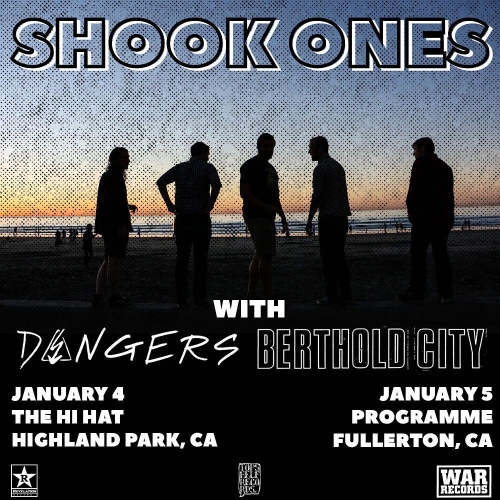
Outside of hardcore now, I know you play in Great Spiders, and I forget the name of the person you play drums for now.
Oh, Sera Cahoone, probably.
Yeah, that’s the one.
Yeah, these days, I do most of my drumming outside of punk and hardcore and aggressive music, and I’m kind of— aside from being on tour for a month at a time, and being gone like I used when I played in more hardcore bands, I’m playing more drums than I ever have. It was a conscious effort maybe five years ago— actually, it was in 2011. After Devotion toured for a month, I was home for three weeks while working part-time at my old job, but I was also working as a drummer for this dude who had all of these summer shows. After that, I went on tour for a month with Punch, which was the best time. This was an incredible summer. There were some really high moments and some really low valleys in my life that year, you know? I had things at home, I had a job which had pay and insurance, I had a girlfriend who I lived with and we had a dog, friends and family. It was just really hard maintaining a job with benefits has always been important, and because I have diabetes, there’s just no way around it for me. Like, if I was born in Canada, I might just try to play music, but until we get there, I’ll be holding down my 40 hours a week elsewhere, which is fine.
So, after that summer, I was just kind of burnt out and I retreated into myself a little bit, and decided I didn’t want to tour as much. I’ve played drums. Like how you asked and I was saying earlier, drumming has been there before punk and hardcore, it’s just who I am. It’s something I always want to do. I’ve been making a conscious effort to play and get outside of that realm, and it’s working out quite well, I’d say. It’s all serendipitous and being lucky, catching good breaks, and having really influential people in my life vouch for me and bring me along on their ride. It’s been good. I actually don’t play in Great Spiders anymore. I mean— yeah, I stopped maybe a year ago. But, you never know. Maybe I’ll be back in that mix one day. Omar, if you’re reading this… But that was too much, I don’t have to get into it. These days, mostly I play for a woman named Sera Cahoone, who is really fantastic. (She’s) kind of an alt-country folk. She’s really fantastic and has a great band. She’s kept the same band for the last ten or twelve years, which is quite a testament. So we play, and I do, for lack of a better word, session drumming for both recording and shows.
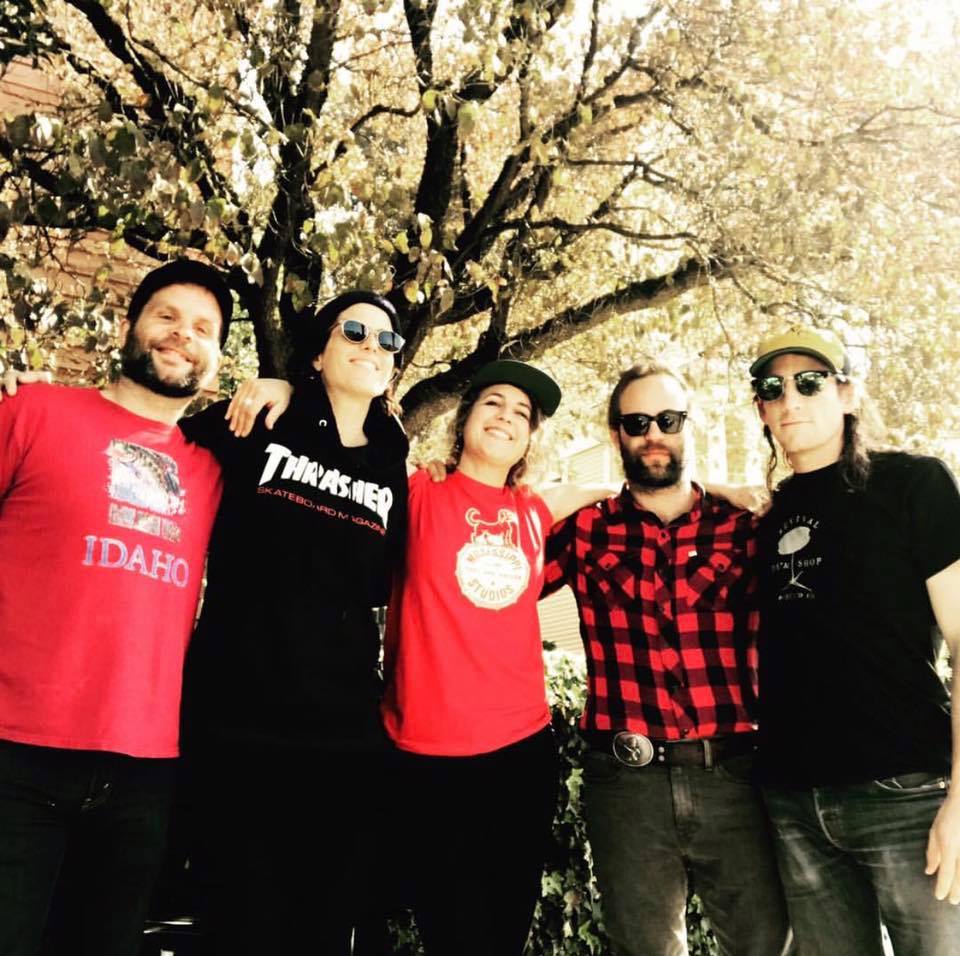
Show-wise, aside from Sera, there’s probably another three singer-songwriters who I am in their band, but they don’t always play with their full band or they don’t play that often. If they have a show and I can’t do it, they don’t cancel the show, they just ask the next person in line. On the other side of that coin, I’m that second or third person for another three or four bands in town. It’s all just like in hardcore, the more you hang and the more you play, it’s just like a community and I feel like i’ve been very welcomed and embraced in that in the Seattle music community.
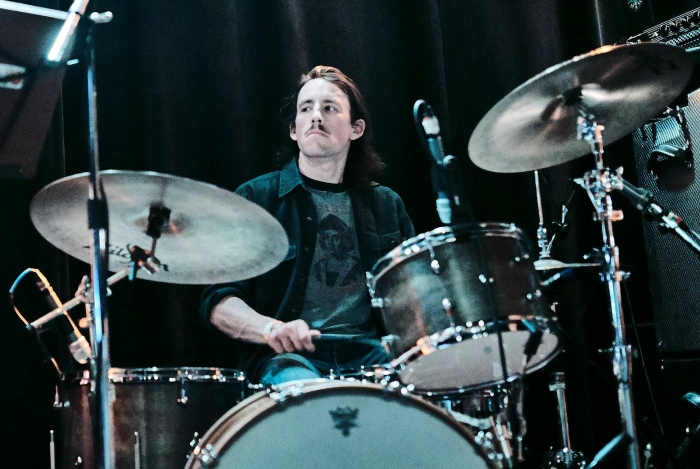
***
Shook Ones will be playing two shows in California with Dangers and Berthold City:
Jan. 4 - Los Angeles, CA @ The Hi-Hat w/ Daisy Chain
Jan. 5 - Fullerton, CA @ Programme Skate & Sound w/ Entry
Tagged: devotion, keep it steady, lights out, shook ones

